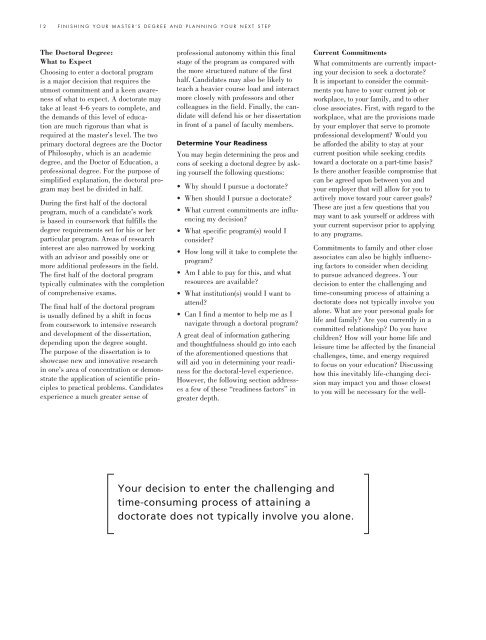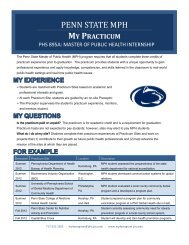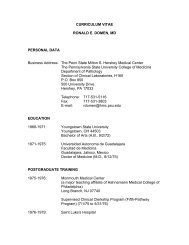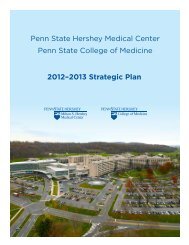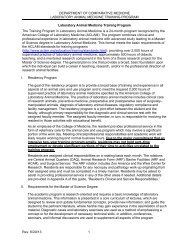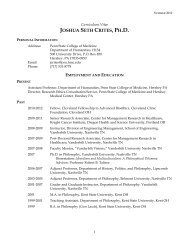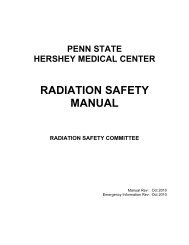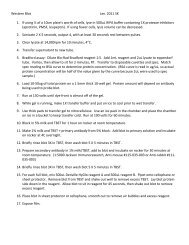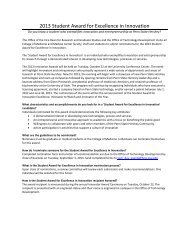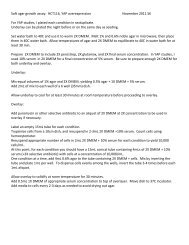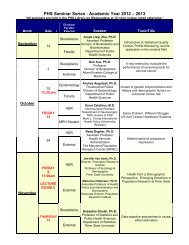Penn State Graduate Student Career Guide - Biomedical Sciences ...
Penn State Graduate Student Career Guide - Biomedical Sciences ...
Penn State Graduate Student Career Guide - Biomedical Sciences ...
You also want an ePaper? Increase the reach of your titles
YUMPU automatically turns print PDFs into web optimized ePapers that Google loves.
12 FINISHING YOUR MASTER’S DEGREE AND PLANNING YOUR NEXT STEP<br />
The Doctoral Degree:<br />
What to Expect<br />
Choosing to enter a doctoral program<br />
is a major decision that requires the<br />
utmost commitment and a keen awareness<br />
of what to expect. A doctorate may<br />
take at least 4-6 years to complete, and<br />
the demands of this level of education<br />
are much rigorous than what is<br />
required at the master’s level. The two<br />
primary doctoral degrees are the Doctor<br />
of Philosophy, which is an academic<br />
degree, and the Doctor of Education, a<br />
professional degree. For the purpose of<br />
simplified explanation, the doctoral program<br />
may best be divided in half.<br />
During the first half of the doctoral<br />
program, much of a candidate’s work<br />
is based in coursework that fulfills the<br />
degree requirements set for his or her<br />
particular program. Areas of research<br />
interest are also narrowed by working<br />
with an advisor and possibly one or<br />
more additional professors in the field.<br />
The first half of the doctoral program<br />
typically culminates with the completion<br />
of comprehensive exams.<br />
The final half of the doctoral program<br />
is usually defined by a shift in focus<br />
from coursework to intensive research<br />
and development of the dissertation,<br />
depending upon the degree sought.<br />
The purpose of the dissertation is to<br />
showcase new and innovative research<br />
in one’s area of concentration or demonstrate<br />
the application of scientific principles<br />
to practical problems. Candidates<br />
experience a much greater sense of<br />
professional autonomy within this final<br />
stage of the program as compared with<br />
the more structured nature of the first<br />
half. Candidates may also be likely to<br />
teach a heavier course load and interact<br />
more closely with professors and other<br />
colleagues in the field. Finally, the candidate<br />
will defend his or her dissertation<br />
in front of a panel of faculty members.<br />
Determine Your Readiness<br />
You may begin determining the pros and<br />
cons of seeking a doctoral degree by asking<br />
yourself the following questions:<br />
• Why should I pursue a doctorate?<br />
• When should I pursue a doctorate?<br />
• What current commitments are influencing<br />
my decision?<br />
• What specific program(s) would I<br />
consider?<br />
• How long will it take to complete the<br />
program?<br />
• Am I able to pay for this, and what<br />
resources are available?<br />
• What institution(s) would I want to<br />
attend?<br />
• Can I find a mentor to help me as I<br />
navigate through a doctoral program?<br />
A great deal of information gathering<br />
and thoughtfulness should go into each<br />
of the aforementioned questions that<br />
will aid you in determining your readiness<br />
for the doctoral-level experience.<br />
However, the following section addresses<br />
a few of these “readiness factors” in<br />
greater depth.<br />
Current Commitments<br />
What commitments are currently impacting<br />
your decision to seek a doctorate?<br />
It is important to consider the commitments<br />
you have to your current job or<br />
workplace, to your family, and to other<br />
close associates. First, with regard to the<br />
workplace, what are the provisions made<br />
by your employer that serve to promote<br />
professional development? Would you<br />
be afforded the ability to stay at your<br />
current position while seeking credits<br />
toward a doctorate on a part-time basis?<br />
Is there another feasible compromise that<br />
can be agreed upon between you and<br />
your employer that will allow for you to<br />
actively move toward your career goals?<br />
These are just a few questions that you<br />
may want to ask yourself or address with<br />
your current supervisor prior to applying<br />
to any programs.<br />
Commitments to family and other close<br />
associates can also be highly influencing<br />
factors to consider when deciding<br />
to pursue advanced degrees. Your<br />
decision to enter the challenging and<br />
time-consuming process of attaining a<br />
doctorate does not typically involve you<br />
alone. What are your personal goals for<br />
life and family? Are you currently in a<br />
committed relationship? Do you have<br />
children? How will your home life and<br />
leisure time be affected by the financial<br />
challenges, time, and energy required<br />
to focus on your education? Discussing<br />
how this inevitably life-changing decision<br />
may impact you and those closest<br />
to you will be necessary for the well-<br />
Your decision to enter the challenging and<br />
time-consuming process of attaining a<br />
doctorate does not typically involve you alone.


